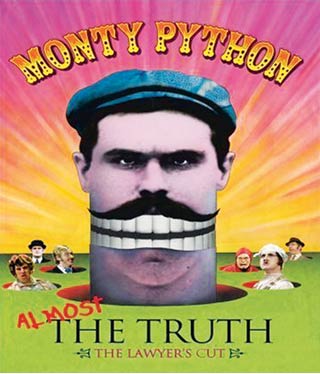Monty Python: Almost the Truth
by M. Faust
Dead Parrot Society
2009 has been crammed with 40th anniversary celebrations, tributes, and remembrances: the first moonwalk, Woodstock, the Manson family murders, etc. But here’s a truly significant one: 1969 was the year British television audiences were first treated to a naked man playing the organ, dead parrots, cheeseless cheese shops, the Spanish Inquisition (which they certainly were not expecting), transvestite lumberjacks, and Spam, all occasionally interrupted by weirdly static animations or brought to a screeching halt by a prim army officer declaring the proceedings “too silly.”

This at a time when the big comedy hit in the US was Rowan and Martin’s Laugh-In.
To the long list of things that are cool about Buffalo, add this: We were one of the first American cities to experience Monty Python’s Flying Circus. Granted, it was an accident of geography—if you had a decent pair of rabbit ears (and in 1970, who didn’t?), you could watch the show on Canadian television. This was at least three years before the British comedy troupe became a staple of Channel 17 pledge drives. (Oh, the hours of J. Michael Collins and Goldie Gardner we endured while they pushed each Python segment back a few more minutes so they could cajole us for money!)
There were only 46 half-hour episodes of the BBC series, but they’ve never been absent for long from the cable TV diaspora, and they’re as funny to kids discovering them now for the first time as they were four decades ago. (By contrast, try looking at an episode of Laugh-In.)
To cash in—er, celebrate—the Independent Film Channel this week premieres Monty Python: Almost the Truth. The six-part series (one episode per night from Sunday through Friday) covers the entire history of the troupe, from their meetings as students at Oxford and Cambridge through their last film and the death of founding member Graham Chapman.
The series features interviews with all five surviving members—John Cleese, Terry Gilliam, Eric Idle, Terry Jones, and Michael Palin, augmented with archival interview footage of Chapman. It’s the Python equivalent of The Beatles Anthology, and while rabid fans will find that at six hours it isn’t long enough, there’s still an awful lot of material here to relish.
When I spoke to Gilliam at the Toronto Film Festival last month, he had seen parts of the series and was amused at how the five of them could be seen to be contradicting each other. “It’s interesting to see how memory fails,” he said. “Maybe the five of us combined can produce a memory that’s close to the truth.”
Watching the DVD version of the series (it will be in stores on October 27), I was more stuck by how little dirty laundry any of them had to air. There’s a certain amount of frustration with Chapman, whose personal life was the closest to the anarchic comedy these otherwise mild-mannered Brits (and one Yank) produced. A heavy drinker who sobered up just prior to filming Life of Brian, Chapman was so perpetually drunk during the filming of Monty Python and the Holy Grail that he could never remember more than a few lines at a time.
The most personal revelations are in the first episode, but are limited to the Pythons’ family relations. We learn why Terry Jones retains a fear of being kissed by men with mustaches. (It has nothing to do with Freddie Mercury.)
Psychobiogaphy aside, Almost the Truth is a must-see for comedy fans for the Pythons’ discussion of their working methods and for the reactions they stirred up, not all of them intentional. After the show was a hit, they started to have problems with censors who found all kinds of filth that existed only in their own minds.
The best episode is the one airing next Thursday, in which they discuss Life of Brian, the movie that was denounced far and wide by people who never bothered to see it. Described by Jones as “heretical but not blasphemous,” the comedy attacks the abuses of religion but never spirituality or the teachings or Christ. And while that may seem obvious to anyone who has seen the film, it didn’t to a British bishop whom Cleese and Palin are seen debating in 1979 television program that I wish someone would issue in full. (For one reason, it shows the famously nice Michael Palin losing his temper.)
blog comments powered by Disqus|
Issue Navigation> Issue Index > v8n42 (Week of Thursday, October 15th) > Monty Python: Almost the Truth This Week's Issue • Artvoice Daily • Artvoice TV • Events Calendar • Classifieds |









 Current Issue
Current Issue